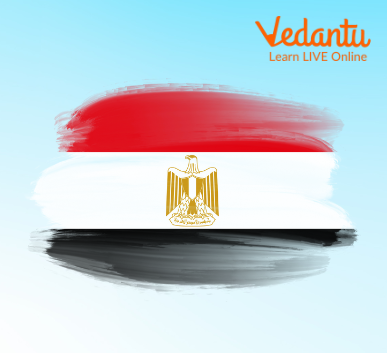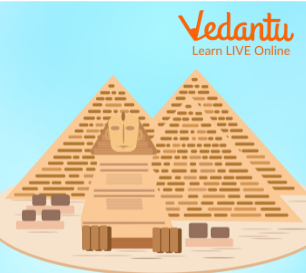




Why Study Egypt? Key Insights for Curious Learners
Egypt is a nation in Africa's northeastern region. One of the principal civilisations of the ancient Middle East was based in Egypt's heartland, the Nile River valley, and delta. Like Mesopotamia further east, it was one of the world's first urban and literate societies. For around 3,000 years, Pharaonic Egypt flourished under a succession of domestic rulers, with brief interludes under foreign administration.
Urban Egypt joined the Hellenistic civilisation after Alexander the Great conquered the area in 323 BCE. An advanced literary community flourished in Alexandria during the rule of the Greek Ptolemaic dynasty, but what is now Egypt was captured by the Romans in 30 BCE. It continued to be a part of Rome.

Egyptian Flag
History of Invasion in Egypt
First, Alexander conquered Egypt, then the Roman and then the Muslims. Egyptian rural life had a high degree of continuity before the Muslim invasion. The culture and language of the rural, whose lives were measured by the annual rise and fall of the Nile River, with its yearly inundation, had changed only slightly over the centuries, despite the incongruent ethnicity of successive ruling groups and the cosmopolitan nature of Egypt's larger urban centres.
After the conquests, both urban and rural societies started to incorporate aspects of Arab culture. Gradually, the Arabic vernacular overtook the Egyptian language as the primary language used in spoken communication. Additionally, Egypt's history since that time has been a part of the larger Islamic world, and despite Egyptians continuing to be dominated by a foreign elite—whether Arab, Kurdish, Circassian, or Turkish—the nation's cultural environment remained largely unchanged.

Urban Countries Attacking Egypt
Interesting Facts about Egypt
The Arab Republic of Egypt is the official name for Egypt. Egypt's population was a little over 83 million in 2012. Although Arabic is the official language in Egypt, many people also understand English and French. Here are some facts about Egypt.
The Mediterranean Sea and the Red Sea, as well as Israel, Libya, and Sudan, are all about Egypt.
Africa and Asia are both present in Egypt's Sinai Peninsula.
With a height of 2,629 metres, Mount Catherine is the tallest mountain in Egypt (8625 ft).
Cairo, which also has the greatest population, is the country's capital. Alexandria and Giza are a couple more significant cities.
Egypt is a relatively arid nation. The majority of Egypt's territory is made up of the Sahara and the Libyan Desert.
Egypt is home to the Nile, the world's longest river.
The Ancient Egyptians, who lived in Egypt and date back to about 3150 B.C., are well known.
The Great Pyramid of Giza, one of the Seven Wonders of the Ancient World, is located in Egypt.
Football is the most popular sport in Egypt (soccer).
The Arab Republic of Egypt is the official name for Egypt.
Egypt's population was a little over 83 million in 2012 (83,688,164).
Along with the Mediterranean Sea and the Red Sea, Egypt also shares borders with Israel, Libya, Sudan, and the Gaza Strip.
Africa and Asia are both present in Egypt's Sinai Peninsula.
With a height of 2,629 metres, Mount Catherine is the tallest mountain in Egypt (8625 ft).
Arabic is the official language of Egypt. However, English and French are also widely spoken and understood.
Cairo, which also has the greatest population, is the country's capital. Alexandria and Giza are a couple more significant cities.
Egypt is a relatively arid nation. The majority of Egypt's land is covered by the Sahara and the Libyan Desert.

Great Sphinx of Giza
Summary
One of the principal civilisations of the ancient Middle East was based in Egypt's heartland, the Nile River valley, and delta. For around 3,000 years, Pharaonic Egypt flourished under a succession of domestic rulers, with brief interludes under foreign administration. The Mediterranean Sea and the Red Sea, as well as Israel, Libya, and Sudan are all about Egypt. Urban Egypt joined the Hellenistic civilisation after Alexander the Great conquered the area in 323 BCE. Egypt is famous for its Pharaohs and pyramids.
FAQs on Egypt: Essential Facts Every Student Should Know
1. Write about infancy in Egypt.
Egypt was taken over by Alexander in 323 BCE, and later by the Romans in 30 BCE. Egyptian rural life had a high degree of continuity before the Muslim invasion. The language and culture of the rural, agrarian masses, whose lives were largely measured by the annual rise and fall of the Nile River, with its yearly inundation, had changed only slightly over the centuries, despite the incongruent ethnicity of successive ruling groups and the cosmopolitan nature of Egypt's larger urban centres.
2. Write five facts about Egyptian civilisations.
The five facts about Egyptian civilisation are listed below:
Egyptian civilisations flourished along with the river Nile.
Domestic kings were referred to as Pharaohs, they were famous for making pyramids and tombs.
Egyptian civilisations were skilled in preserving bodies, preserved bodies were referred to as mummies.
Around 130 pyramids were found in Egypt made by Egyptian civilisations.
Egyptians knew how to use mouldy bread to heal wounds and prevent infection.
Cairo, which also has the greatest population, is the country's capital. Alexandria and Giza are a couple more significant cities.









